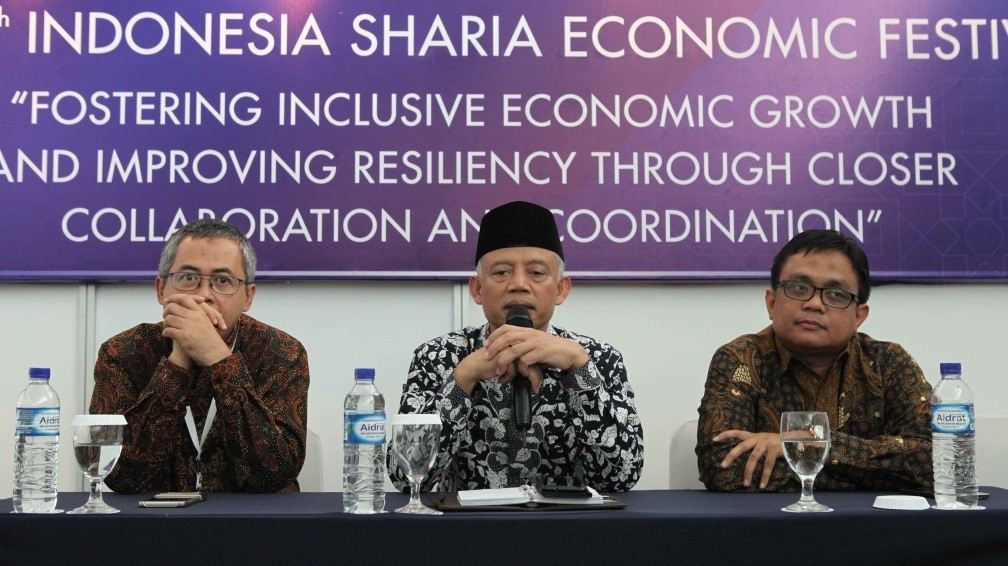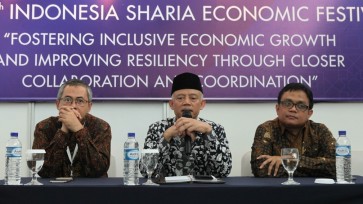Popular Reads
Top Results
Can't find what you're looking for?
View all search resultsPopular Reads
Top Results
Can't find what you're looking for?
View all search resultsIslamic economic revolution 4.0
The emergence of technology breakthroughs will unequivocally reshape the operation and business models of industries in the Islamic economy. However, the adoption of technological innovation in the industries will lead to efficiency, productivity and market penetration. The integration of technological innovation into the operation and business models of the Islamic economy is driving the Islamic economic revolution 4.0.
Change text size
Gift Premium Articles
to Anyone
K
laus Schwab, the founder and executive of the World Economic Forum, has introduced the fourth industrial revolution or Industry 4.0, the ongoing technological revolution that is affecting the way we live, work and relate to one another. Unlike previous industrial revolutions, the Industry 4.0 is characterized by a range of new technologies that fuse the physical, digital and biological spheres that affect human life, as the professor wrote in 2016. Moreover, it is disrupting almost every industry and bringing transformation to entire systems of production, management and governance.
The Islamic economy — consisting of economic sectors whose core products and services are structurally affected by Islamic ethics and law — has established an increasingly important footing in the global economy (Global Islamic Economic Report, 2019). The sectors are halal food, fashion, Muslim-friendly travel, cosmetics, pharmaceuticals, Islamic-themed media and Islamic financial services. According to the above report, global Muslim consumers spent US$2.2 trillion in 2018 in the food, pharmaceutical and lifestyle sectors. The number is expected to reach $3.2 trillion by 2024, while Islamic financial assets are forecasted to reach $2.5 trillion in 2018.
Islamic economic sectors are emerging amid economic transformations driven by the new technological revolution. The emergence of technology breakthroughs such as artificial intelligence, robotics, the internet of things, peer-to-peer finance, blockchain, big data, quantum computing, e-commerce, cloud storage and open banking will unequivocally reshape the operation and business models of industries in the Islamic economy. However, the adoption of technological innovation in the industries will lead to efficiency, productivity and market penetration. The integration of technological innovation into the operation and business models of the Islamic economy is driving the Islamic economic revolution 4.0.
Indonesia, with its large Muslim population and status as the 16th-largest economy in the world, is primed to be a global player in the Islamic economy. The country is considered a “hidden treasure”, Prof. Jonathan Wilson wrote in 2013, and a “sleeping giant” of the global Islamic economy by Sutan Emir Hidayat, a director of the National Islamic Finance Committee (KNKS). Indonesia’s market potential is still largely untapped in the Islamic economy.
The ecosystem for supporting Islamic economic business activities in Indonesia has shown a substantial improvement. Indonesia’s ranking in the Global Islamic Economy Indicators list has moved from tenth place in 2018 to fifth place in 2019. In addition, Indonesia is now a “leading country” — the highest score in the Islamic Finance Country Index — in terms of its leadership and potential in global Islamic finance.
For the Islamic economic sectors to benefit from the digital revolution, the 2019-2024 Halal Economy Master Plan highlights the digital economy as among the four fundamental strategies for making Indonesia a major player in the global halal economy by 2024. The plan stresses the importance of the digital economy, including e-commerce, online marketplaces and digital finance, in supporting the Indonesian segment of the Islamic economy.
For example, the KNKS and two of Indonesia’s largest e-commerce start-ups, Tokopedia and Bukalapak, have formed a joint partnership to establish a halal marketplace, which specifically accommodates halal transactions as reported this year. The development of an electronic halal payment system for the daily needs of Muslims is in high demand. In response to such a need, the app LinkAja is in the process of becoming a shariah-compliant digital payment platform and electronic money source.


















